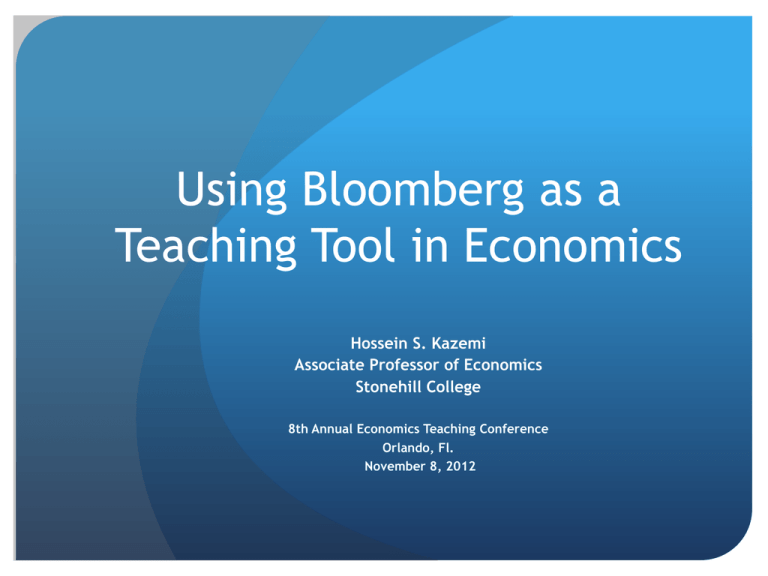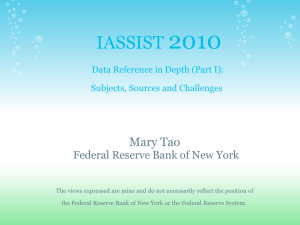Use of Technology in Teaching Economics and Finance
advertisement

Using Bloomberg as a Teaching Tool in Economics Hossein S. Kazemi Associate Professor of Economics Stonehill College 8th Annual Economics Teaching Conference Orlando, Fl. November 8, 2012 Motivation Teaching Economics vs. science engaging students reinforcing the material more in depth understanding of the material better absorption of material better retaining of material improved assignments improved test results better real life understanding of economics better internships and jobs better skills at work increased number of majors happier administrators happier book publishers Typical Teaching Approaches chalk and talk method a good lecturer will capture students' attention a good lecturer will attract more students a good lecturer will keep students engaged publisher supplied power point presentation for the text forces the instructors to stay focused minimizes the possibility of going on a tangent Shallow boring to students boring to the instructor did I say boring? Review of the Literature Out of 14 of the articles in this paper's literature review, 12 argue that use of technology helps. the two that did not were based on the following that students’ performance in virtual courses was inferior to that of students who took live or ‘hybrid’ classes where face-to-face lectures were integrated with a variety of online material. A study of the effectiveness of web-based homework in teaching undergraduate business statistics" did not find any significant difference between the performance of students who had been assigned a variety of web-based homework and students who had been assigned traditional textbook-based homework. Summary of the Lit. Review study author/s title technology used principal findings bottom line yes or no Table 1 Summary of Studies of the Efficacy of Technology in Teaching Economics Study Title Technology Principal Finding(s) Does Technolo gy Improve Learning Notes Murray (1999) Econometrics Lectures in a Computer Classroom Computer Simulations: Monte Carlo methods - Discusses the benefits of use of Monte Carlo in teaching Econometrics. Concludes that there are caveats but computer use is beneficial. Yes Some Caveats Mark S. Walbert and Anthony L. Ostrosky(1997) Using Mathcad to Teach Undergraduate Mathematical Economics Computer software for Engineers: Mathcad -Test scores 11% higher than scores earned by students who did not use Mathcad, an increase of more than one letter grade Yes The use of Mathcad in a one-semester undergraduate mathematical economics course. Students in both groups took identical tests and by controlling for study time, they were able to rule out the suggestion that increased time on tasks raised the test scores of the students in the Mathcad section. - Mathcad could also allow the instructor to cover topics or introduce techniques that were formerly considered too advanced. Table 1 Continued… Summary of Studies of the Efficacy of Technology in Teaching Economics Study Title Technology Principal Finding(s) William E. Becker and Michael Watts(2001) Teaching Economics at the Start of the 21st Century: Still Chalk-and-Talk Chalk-andTalk -Economists use passive teaching techniques and this may be causing decrease in enrollment in economics courses. - Economists have not adopted active teaching. Saunders (1998) Learning Theory and Instructional Objectives Salemi (2002) An Illustrated case for active learning - New learning (with technology) is more efficient if linked to material students have previously learned. - A strong case for active learning techniques by outlining numerous benefits that stem from their inclusion in the classroom. He gives an example of active learning. Active learning is neither a panacea nor a free good. In their experience, it is a strategy through which students gain lasting understanding of important economic concepts. Does Technolo gy Improve Learning Yes Yes Notes Table 1 Continued… Summary of Studies of the Efficacy of Technology in Teaching Economics Study Title Technology Principal Finding(s) Does Technology Improve Learning Hawker(1986) The effects of replacing some manual skills with computer algebra manipulations on student performance in business calculus Computer Algebra Manipulations Yes Heid(1988) Resequencing skills and concepts in applied calculus using the computer as a tool Computer Found evidence that students using computer algebra systems perform as well as or better than students in traditional business calculus courses. Judson(1988) Effects of modified sequencing of skills and applications in introductory calculus Palmiter (1991) Effects of computer algebra systems on concept and skill acquisition in calculus Empirical results indicated that students who used the computer algebra system scored higher on tests covering both their conceptual knowledge as well as their ability to do computations. Yes Computer Algebra Systems Notes - In a broader study, the performance of university students taught engineering calculus using a computer algebra system was compared to the performance of students using paper-andpencil computations. Both groups received lecture as a primary means of instruction throughout the semester. However, after five weeks, the computer algebra system group also spent time engaged in active learning with computer-oriented labs. Table 1 Continued… Summary of Studies of the Efficacy of Technology in Teaching Economics Study Title Technology Principal Finding(s) Does Technolog y Improve Learning Galbraith and Pemberton (2001) Digging Beneath the Surface: When Manipulators, Mathematics, and Students Mix On the use of symbolic computation in undergraduate microeconomics instruction Computer Software Yes Miles Cahill and George Kosicki (2000) Exploring Economic Models Using Excel Excel Software - Found a strong correlation between confidence and motivation after integrating Maple into undergraduate mathematics courses in Australia. -Eight of the 10 questionnaires characterized the experience with Maple as helpful or positive. A number of students commented that Maple allowed them to focus more on economics and less on mathematics. They don't have evidence for efficacy but suggest that their methods may lead to improvements. Owen, A. (2007) Integrating Computer Applications Into Economics Electives Computer Applications Some evidence has been presented that suggests that students enjoy economics courses more when they are taught in this way and are more actively engaged in the material. Yes Boyd, D.W. (1998) Computer Software Yes Notes Table 1 Continued… Summary of Studies of the Efficacy of Technology in Teaching Economics Study Title Paul G. King and Ross M. LaRoe (1991) The Laboratory-Based Economics Curriculum Kendrick, Mercado and Amman (2006) Computational Economics: Help for the Underestimated Undergraduate Technology Principal Finding(s) The revised TUCE test results showed significant increases in student understanding of macroeconomics in all sections. Provide examples from a number of fields of economics and discuss how they can be used to develop opportunities for students to learn about and then modify these computational models. Does Technology Improve Learning Notes Yes An analysis of variance test indicates that students in the lab sections learned more than students in the non-lab section. The F statistic shows a significant difference between the lab and non-lab sections at the recognition level, but not at the explicit level. Table 1 continued… Summary of Studies of the Efficacy of Technology in Teaching Economics Study Title Elliott (2003) Using a personal response system in economics teaching Brown and Liedholm (2002) Can web courses replace the classroom in principles of microeconomics? Palocsay and Stevens (2008) Technology Principal Finding(s) Does Technology Improve Learning - reported improvement in students’ performance and in their enjoyment of lectures after introducing a Personal Response System. Yes Web Technology found, however, that students’ performance in virtual courses was inferior to that of students who took live or ‘hybrid’ classes where face-to-face lectures were integrated with a variety of online material. No Computational Economics: Help for the Underestimated Undergraduate Web Technology A study of the effectiveness of web-based homework in teaching undergraduate business statistics" did not find any significant difference between the performance of students who had been assigned a variety of web-based homework and students who had been assigned traditional textbook-based homework. No Dufresne et al. (2002) Using a personal response system in economics teaching Web Technology - The effect of web-based homework on test performance in large enrollment introductory physics courses Yes Lass et al. (2007) Teaching with technology to engage students and enhance learning found that online homework did lead to higher exam performance. Notes Five Step Approach Show students the tools in the discipline Use Bloomberg to crunch the numbers and see how things work at the technical level Use Bloomberg to show the interaction between economic news and financial markets Have them follow up the lecture and Bloomberg presentation with CNBC, WSJ, the Barron’s and the Economist Have them produce a report that highlights what they have learned and its connection with what they have seen and read in the media Courses where Bloomberg used: Bloomberg is used by the author in a series of Economics and Finance classes over the course of the past 15 years at four of the major Boston area colleges in business, economics and school of management. Courses such as Money & Banking, Macro Theory, Investments, Monetary Policy, International Finance, Impact of News on Financial Markets, Capital Markets and Investments, Investments & Portfolio Analysis, Money & Financial Markets, Fixed Income Analysis, and Portfolio Management. Examples of How to Use Bloomberg Effect of QE on Equity Markets Equity Analysis Treasury Securities Yield Curve Fixed Income Analysis Market Indexes and Volatility Fed Funds Rate and Taylor Rule Dow Industrial’s Response to QE1 Dow Industrial’s Response to QE2 Dow Industrial’s Response to Operation Twist Figure 1. Bloomberg Quote for Apple Computers Inc. Source: Bloomberg Professional November 7, 2012 Figure 3. Bloomberg Earnings Estimate for Apple Computers Inc. Source: Bloomberg Professional November 7, 2012 Figure 4. Beta for Apple Computers Inc. Source: Bloomberg Professional November 2, 2012 Figure 5. Bloomberg Earnings Estimate V.S. Price for Apple Computers Inc. Source: Bloomberg Professional May 26, 2012 Figure 6. Bloomberg Bollinger Bands for Apple Computers Inc. Source: Bloomberg Professional November 7, 2012 Figure 7. Price Ratios for Apple Computers Inc. Source: Bloomberg Professional May 26, 2012 Figure 8. Price and Volume Movements for Apple Computers Inc. Source: Bloomberg Professional November 7, 2011- November 7, 2012 Apple’s 20% decline since it’s September 19th peak Figure 9. 10-Day Intraday Price for Apple : Face Book Phenomenon Source: Bloomberg Professional May 14 - May 25, 2012 Figure 10. Trade/Quote Recap for Apple Computers Inc. Source: Bloomberg Professional November 7, 2012 Figure 11. Relative Value Comparison for Apple Computers Inc. Source: Bloomberg Professional November 7, 2012 Using Bloomberg to Present Treasury Actives and Derive Yield Curve Treasury Bills Treasury Notes Treasury Bond Treasury Inflation Protected Securities (TIPs) Derivation of Yield Curve Figure 12. Treasury Actives (PX1) Source: Bloomberg Professional November 7, 2012 Figure 13. US Yield Curve Source: Bloomberg Professional November 7, 2012 Figure 14. International Yield Curve Source: Bloomberg Professional November 7, 2012 Bonds: Pricing/Yield bid/ask price yield to maturity accrued interest reinvestment interest street convention duration convexity Figure 15. Treasury Actives Source: Bloomberg Professional November 7, 2012 Figure 16. Yield Analysis Source: Bloomberg Professional November 7, 2012 Figure 17. Impact of News on Financial Markets November 7, 2012 Figure 18. Taylor Rule: Inflation/Unemployment Gap Model Figure 19. Taylor Rule: Stone & McCarthy Model Figure 20. Taylor Rule: Deutsche Bank Model Challenges Administrators lack of support poor understanding of Bloomberg capabilities budgetary limitations IT lack of timely response when help is needed slow bandwidth rare internet connection interruption Students addiction to using ctrl+c and ctrl+v unwillingness to sub Bloomberg for the internet Challenges continued... Instructor teaching with a new technology is not easier time consuming requires revamping the entire course have to be ready to do chalk-and-talk if any glitches be prepared to hit the curve balls from technology suppliers Faculty Peers the biggest hurdle unwillingness to sign on unwillingness to learn new tricks unwillingness to have their students trained see it as too big of an investment











